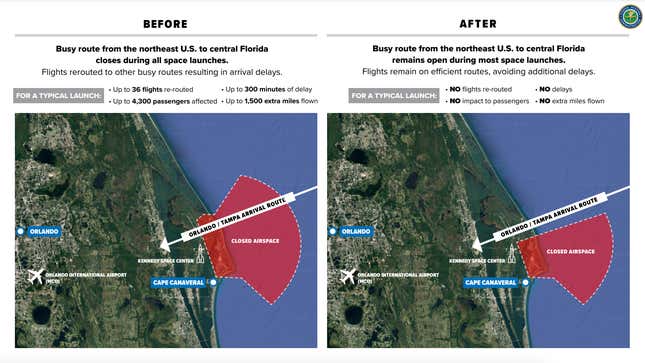FAA Eases Airspace Restrictions for Florida Rocket Launches
The Federal Aviation Administration (FAA) is looking to limit the disruptions caused by rocket launches from Florida’s space coast, significantly reducing the amount of airspace closed off during liftoffs.
After reexamining the existing airspace restrictions for most Florida launches, the FAA determined that they were “too large and could be safely reduced,” the administration wrote in a recent statement. The FAA, therefore, introduced new, smaller zones for restricted airspace during rocket launches so as not to impact central Florida airports.
“Previously for a typical launch, up to 36 flights were rerouted to congested overland routes, slowing up to 4,300 passengers and resulting in upwards of 300 minutes of delay and 1,500 extra miles flown,” according to the FAA. “These flights can now remain on their most optimal and efficient routes more frequently.” The FAA added that, for 10 of the 12 launches that have transpired since the new rules took effect in April, “no flights on this route were rerouted.”
For a typical Florida launch, the FAA claims that no flights will be re-routed, and that these launches will have no impact to passengers and won’t result in delays or extra miles flown.
The FAA determined that more than 80 percent of launch trajectories from Florida are to the east and south, therefore the amount of closed airspace to the north of the space coast can now remain open during most launches. “Within this northern section is the busy overwater route from the northeast to central Florida airports in Orlando, Tampa, St. Petersburg and Sarasota, among others,” the FAA wrote.
Last year, Florida’s space coast saw a record-breaking 57 rockets take off to the skies, averaging more than one launch a week. That number is a significant jump from 42 launches in 2021 and is likely to increase this year. The space coast includes valuable launch pads at Cape Canaveral Space Force Station, from which SpaceX launches its Falcon 9 rocket, and the Kennedy Space Center, which saw the launch of NASA’s Artemis 1 mission.
Related article: Historic Launch Pad That Sent First U.S. Astronaut to Orbit Is Back in Action
As more rocket launches are planned to lift off from Florida’s space coast, the FAA is trying to mitigate the effects of those often-disruptive launches. Earlier this year, the administration released an updated set of guidelines in determining whether the FAA would delay a commercial rocket launch. As part of the new guidelines, the FAA would consider how many flights or passengers are affected by the launch, whether the launch falls on a holiday, and the purpose of the mission (prioritizing missions that serve national interest).
For more spaceflight in your life, follow us on Twitter and bookmark Gizmodo’s dedicated Spaceflight page.
The Federal Aviation Administration (FAA) is looking to limit the disruptions caused by rocket launches from Florida’s space coast, significantly reducing the amount of airspace closed off during liftoffs.
After reexamining the existing airspace restrictions for most Florida launches, the FAA determined that they were “too large and could be safely reduced,” the administration wrote in a recent statement. The FAA, therefore, introduced new, smaller zones for restricted airspace during rocket launches so as not to impact central Florida airports.

“Previously for a typical launch, up to 36 flights were rerouted to congested overland routes, slowing up to 4,300 passengers and resulting in upwards of 300 minutes of delay and 1,500 extra miles flown,” according to the FAA. “These flights can now remain on their most optimal and efficient routes more frequently.” The FAA added that, for 10 of the 12 launches that have transpired since the new rules took effect in April, “no flights on this route were rerouted.”
For a typical Florida launch, the FAA claims that no flights will be re-routed, and that these launches will have no impact to passengers and won’t result in delays or extra miles flown.
The FAA determined that more than 80 percent of launch trajectories from Florida are to the east and south, therefore the amount of closed airspace to the north of the space coast can now remain open during most launches. “Within this northern section is the busy overwater route from the northeast to central Florida airports in Orlando, Tampa, St. Petersburg and Sarasota, among others,” the FAA wrote.
Last year, Florida’s space coast saw a record-breaking 57 rockets take off to the skies, averaging more than one launch a week. That number is a significant jump from 42 launches in 2021 and is likely to increase this year. The space coast includes valuable launch pads at Cape Canaveral Space Force Station, from which SpaceX launches its Falcon 9 rocket, and the Kennedy Space Center, which saw the launch of NASA’s Artemis 1 mission.
Related article: Historic Launch Pad That Sent First U.S. Astronaut to Orbit Is Back in Action
As more rocket launches are planned to lift off from Florida’s space coast, the FAA is trying to mitigate the effects of those often-disruptive launches. Earlier this year, the administration released an updated set of guidelines in determining whether the FAA would delay a commercial rocket launch. As part of the new guidelines, the FAA would consider how many flights or passengers are affected by the launch, whether the launch falls on a holiday, and the purpose of the mission (prioritizing missions that serve national interest).
For more spaceflight in your life, follow us on Twitter and bookmark Gizmodo’s dedicated Spaceflight page.
